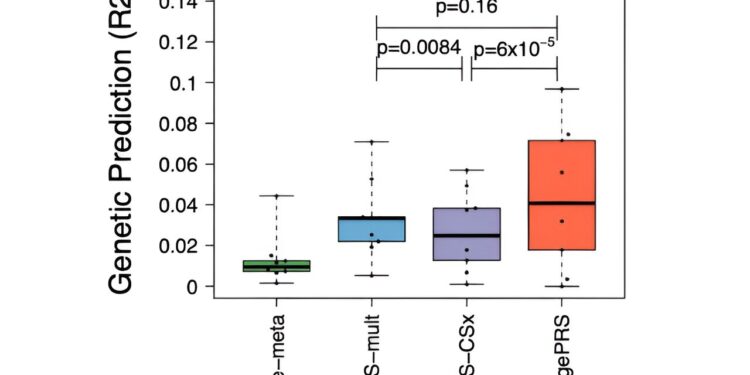BridgePRS improves prediction of individuals of African ancestry in the New York BioMe cohort. Credit: Icahn School of Medicine at Mount Sinai
A team of scientists at the Icahn School of Medicine at Mount Sinai has developed a revolutionary statistical technique, “BridgePRS,” to improve disease prediction in people of non-European ancestry, particularly those of African ancestry. This development represents an important step toward reducing health care inequities and a future of more personalized and precise medical interventions based on genetic information. Details of their work have been published in Natural genetics on Wednesday, December 20.
Current polygenic risk scores (PRS), essential tools for predicting disease risk encoded in our DNA, are primarily based on genetic data from individuals of European ancestry. This bias makes them less accurate for people of African or Asian descent, thereby exacerbating health care inequities between different ethnic groups.
The researchers embarked on this study to improve disease prediction from genetics in non-European individuals. A key goal of personalized medicine is disease prevention, but current PRS are poor predictors, particularly in non-European populations.
“While we need more genetic data from diverse ancestries, our method combines existing data to help maximize disease prediction in all people,” explained Clive Hoggart, Ph.D., assistant professor of genetics. and genomic sciences and lead author of the article. “The biology behind disease is remarkably similar across ancestry, enabling this progress.”
“We hope our method will pave the way for scientific research into disease risk in diverse populations around the world,” said Paul O’Reilly, Ph.D., associate professor of genetics and genomic sciences and senior author. “Disease prevalence and the importance of different biological pathways can vary globally. Understanding these differences is crucial to advancing disease prediction and treatment.”
The field of optimizing disease prediction through PRS is highly competitive and favors rapid progress. Dr. O’Reilly notes, “Our BridgePRS method is particularly promising for predicting disease in individuals of African ancestry, a group with rich genetic diversity that may offer new insights into human diseases.
While recognizing the potential of genetics and DNA to predict future diseases and the role of PRS in precision medicine, it is essential to understand that the biology behind diseases does not differ significantly depending on ancestry groups or races.
The paper is titled “BridgePRS Exploits Shared Genetic Effects Across Ancestors to Increase Polygenic Risk Score Portability.” »
The remaining authors, all with Icahn Mount Sinai unless otherwise noted, are Shing Wan Choi, Ph.D. (Regeneron Genetics Center), Judit García-González, Ph.D., Tade Souaiaia, Ph.D. (Suny Downstate Health Sciences) and Michael Preuss, Ph.D.
More information:
BridgePRS leverages shared genetic effects across ancestors to increase polygenic risk score portability, Natural genetics (2023). DOI: 10.1038/s41588-023-01583-9, www.nature.com/articles/s41588-023-01583-9
Provided by Mount Sinai Hospital
Quote: Researchers develop a new method to improve the prediction of diseases according to various ancestry (December 20, 2023) retrieved December 20, 2023 from
This document is subject to copyright. Apart from fair use for private study or research purposes, no part may be reproduced without written permission. The content is provided for information only.



